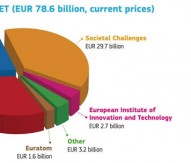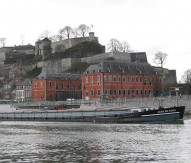

Arlene Foster © DETI
On the horizon in Northern Ireland
Competition will be tough for Horizon 2020 funding. All 27 EU member states are eligible to apply for funding, in addition to several countries which have signed association and ‘third country’ agreements with the EU. This tough competition has led to some regions, particularly in the United Kingdom, to form their own Horizon 2020 action plan in an attempt to draw an increased share of the estimated €70bn budget that will be available.
Northern Ireland’s Horizon 2020 Action Plan was drawn up following a detailed review of its participation in FP7. The Northern Ireland Executive hopes that the establishment of national contact points, a NI Horizon 2020 manager and the creation of an additional support fund for the country’s two universities will assist Northern Ireland in its innovation activities. Arlene Foster is the Minister of Enterprise, Trade and Investment and outlined the action plan to Horizon2020projects.com.
What was the main driving force behind the development of a specific Horizon 2020 action plan for Northern Ireland?
The driving force behind the publication of the action plan has been to increase the success of NI applicants to EU R&D and Innovation funding programmes. The action plan followed a review of our existing support mechanisms as well as key FP7 participants and was completed by my department in 2012. This review was undertaken to ensure that NI companies and research organisations had the best possible support to be successful in FP7 and importantly that we were well prepared for Horizon 2020. Engagement with Horizon 2020, as with FP7, is much more than just the receipt of funding – it also about the collaborative links that can be made across the EU. It helps raise the profile of NI research and innovation capabilities, providing access to potential new markets and customers and provides invaluable opportunities for our researchers to work with world class research organisations and global companies where it would not otherwise be possible.
My colleague, the Minister for Employment and Learning, Dr Stephen Farry, has also welcomed the publication of the action plan, highlighting the key role of Northern Ireland’s two universities and the co-ordinated approach the Executive is taking in preparing for the imminent arrival of Horizon 2020.
What steps is Northern Ireland making to best take advantage of Horizon 2020?
The Horizon 2020 action plan details a series of key steps to be undertaken this year to ensure that NI researchers in academia, industry and the public sector have the necessary levels of support to be successful in Horizon 2020. My department has appointed Dr Simon Grattan as the NI Horizon 2020 manager and this new role will be to oversee the delivery of this plan.
One of the key actions under the plan has been the establishment, jointly by myself and Minister Farry, of a new ‘Higher Education – EU Support Fund’ which will provide Queen’s University Belfast and the University of Ulster with significant financial support to assist them to develop and implement a strategic approach to becoming more successful in FP7 and particularly Horizon 2020.
The fund will also support the employment of seven ‘Northern Ireland Horizon 2020 Contact Points’ (NICP) and they will provide specialist advice and assistance to academics and businesses across areas of economic relevance to Northern Ireland and of priority to the European Commission. This will include the areas of energy, advanced materials, transport technologies, ICT and connected health.
The NICP network, which will be co-ordinated by Grattan, will be supplemented by Invest Northern Ireland, which will assume the role of a NICP for SMEs, and by the Department of Agriculture and Rural Development, which will appoint a dedicated contact point for the agri-food sector. These experts will provide direct support to potential Horizon 2020 applicants through activities that will include workshops on specific areas of the scheme. This network will complement the on-going support provided by Invest Northern Ireland as well as InterTradeIreland, which will continue to support and encourage collaborative applications with the Republic of Ireland in this area.
How can Northern Ireland’s research and innovation priorities still be met whilst collaborating in Horizon 2020 and the wider EU research community?
The priorities set out under Horizon 2020 are complementary with those been brought forward within Northern Ireland. We have highlighted the importance of the Excellent Science pillar of Horizon 2020 in our action plan and hence the requirement for specific strategies in relation to the accessing of these specific schemes.
European Research Council funding is a highly prestigious award for which our academic community should be aiming and additionally to our institutions who should be aiming to attract ERC grant holders. The commitment to this funding scheme is a sign of our continued desire to enhance the existing research excellence that we know exists within NI and to ensure that it is taken to this higher EU level.
The Marie Curie Actions is an excellent example of how collaborative working can be of enormous benefit to all concerned and meets well with our desire in NI to see greater academic and industrial collaboration. Additionally, the movement of researchers to and from NI is recognised as being a tremendous opportunity not only for the individual but also for those others within the host entity involved.
My department, in partnership with the Department for Employment and Learning and the other Executive departments, remains fully committed to seeing through the points raised by the action plan. We continue to work together to ensure that the approach taken is a coherent and unified one for the best interests of our applicants. We will continue to be in discussion with our academics, companies and others who are seeking to apply to ensure that we are doing all that we can to support and encourage their activities.
Arlene Foster


